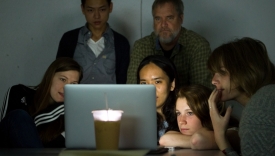Theater and Dance 231 - Reclamation: Restoring the Black Legacy in American Theater
M/W | 12:30 PM - 1:50 PM
(Offered as THDA 231 and BLST 231) Did you know that James Hewlett, a 19th-century Black actor, was among the first to perform solo plays? Yet, despite its rich two-century-old history, Black American Theater has consistently been overlooked and excluded from the annals of American theater. With "Reclamation," we will embark on an exciting journey to excavate the legacy of Black American theater pioneers and their incredible impact on contemporary theater. We will use genealogy as our guide, digging deep into various historical resources like census reports, newspapers, birth and death records, and more.
The course will serve as a collaborative community of learners, coming together to restore and preserve the stories of Black theater pioneers in American history. We plan to conduct research at the Amherst College Archives and the Schomburg Center for Research in Black Culture in New York City. We will analyze our findings by asking: How did American theater counter Black stereotypes? Is white American theater receptive to accountability? Why is there a lack of Black representation in theater audiences?
We will explore key moments in Black American theater history, including the founding of the African Grove Theater in 1821, the revolutionary legacy of Ira Aldridge, and the beautiful resistance of Alice Childress. We will also examine significant plays, films, books, and artists, such as William Wells Brown, August Wilson, and Dominique Morisseau. Limited to 22 students. Spring semester. Professor Sears.
How to handle overenrollment: Roster managed for balance of class years and interests; preference to majors, first-years and sophomores
Students who enroll in this course will likely encounter and be expected to engage in the following intellectual skills, modes of learning, and assessment: Reading assignments, video viewing assignments, class discussion, independent research, academic writing, and presentations.



